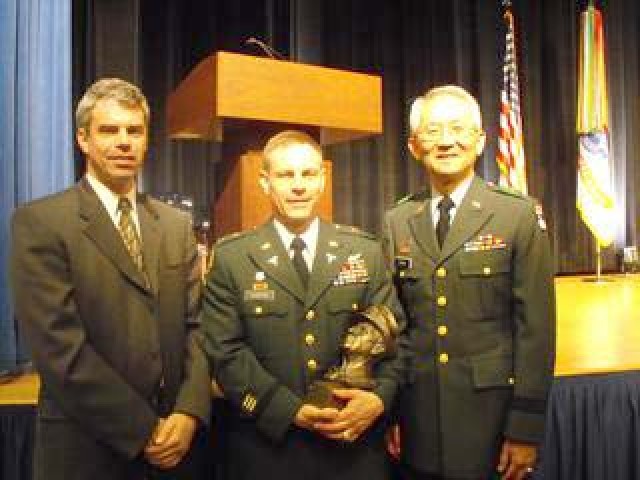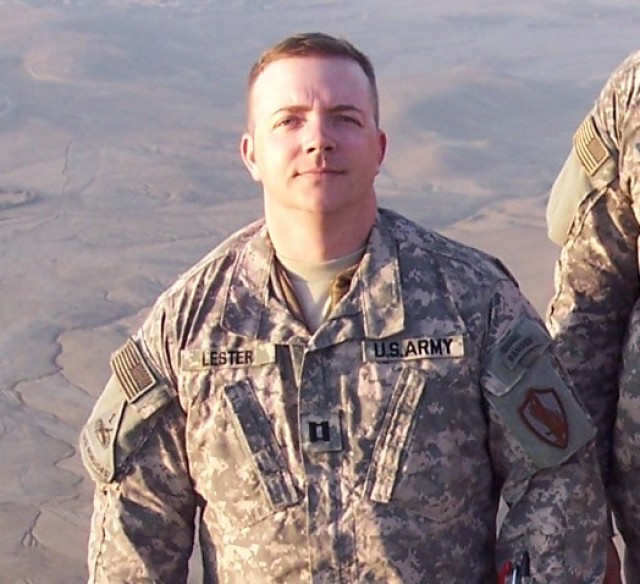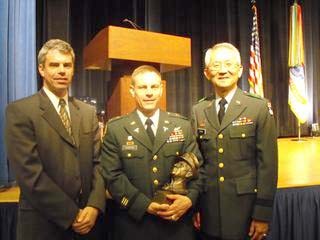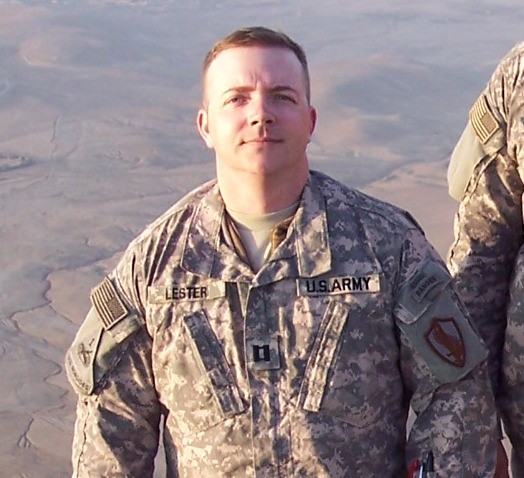Two officers of the Army Medical Service Corps were among 28 company-grade Army officers recognized with General Douglas MacArthur Leadership Awards during a ceremony at the Pentagon on May 8.
Capt. Jeffrey A. Duncan, training officer for the Army Reserve's 807th Medical Deployment Support Command in Salt Lake City, Utah, and Capt. Paul B. Lester, a psychologist on the faculty of the United States Military Academy at West Point, N.Y., received busts of MacArthur from Army Chief of Staff Gen. George W. Casey Jr.
MacArthur was a combat commander in World War I, World War II and the Korean War and one of only five Army generals to wear five stars. The officers selected for this award display commitment to the Army values; unequaled technical and tactical competence; and a mature understanding of their leaders, subordinates and peers.
"I've been playing this game for 22 years and never been asked to come to the Pentagon and receive something like that," said Duncan. "It was a very strong group of individuals who got it. To be considered part of that group is a high honor."
Duncan coordinates individual and unit training for 11,000 Army Reservists in units from the Ohio River to California.
He commanded the 396th Medical Company (Ground Ambulance) in Iraq. His company supported five forward operating bases in northern Iraq, performing more than 600 combat logistics patrols and moving more than 800 patients, all with zero accidents or injuries.
Initiatives by Duncan greatly improved personnel and equipment readiness in the unit. He instituted a robust training regimen including work at combat support hospitals, and ensured all medics in the unit were recertified as emergency medical technicians.
The company was the first unit to routinely use the BMIST-J hand-held device for an electronic medical record from point of injury forward.
"Once you get used to it, it worked pretty well," Duncan commented.
Upon redeployment, Duncan implemented a Yellow Ribbon Reintegration Plan involving marriage counseling, suicide prevention, financial counseling, domestic violence awareness, employment assistance and services for children.
Duncan has two Master's degrees and is working on a Doctor of Business Administration degree. He also qualified as a Lean Six Sigma Master Black Belt while improving several programs of Independence Community College in Kansas.
A USMA graduate and former infantry officer, Lester went back to West Point after completing a Doctorate in leadership and management with a minor in psychology at the Global Leadership Institute of the University of Nebraska. He accepted a reduction in rank to voluntarily transfer from infantry to the MSC to pursue research he believes will benefit the Army. He teaches West Point cadets courses in military leadership, leadership theory and development, and leaders in action.
Lester will leave West Point this summer to become lead research psychologist for the Army's new comprehensive Soldier fitness program, an initiative to increase Soldier resiliency and improve overall fitness in the mental, emotional, spiritual, family strength and physical domains.
Last year while deployed he worked as a mentor and course developer for the National Military Academy of Afghanistan. He also compiled a 150-page textbook that will be used to teach Afghan military officers about leadership.
"I was told they had no document about leadership in the entire country that had been translated into Dari or Pashtun. They want to move from a very authoritarian model to a more modern theory of leadership," he said.
"Their faculty told me their leadership is very top-driven. They want to take an approach that will get people more engaged. It will take time," he added.
Lester also spent two months in Iraq with the 1st-66th Armor and 2nd-6th Infantry researching the impact of leadership in combat environments. He conducted more than 120 interviews, collected more than 700 questionnaires and wrote a book that will be integrated into leadership courses at West Point. He also conducted research on post-traumatic stress disorder and post-traumatic growth.
"We looked at positive and negative psychological impacts of exposure to combat, and what leaders can do to minimize the negative effects," he said.
"The ceremony was great," Lester said. "This is just a huge honor for me and my family to be able to come to a place like this and to have worked with so many great Soldiers throughout the years. I look forward to continuing to help Soldiers until the day I retire."
Duncan listed honesty, fairness and consistency as important traits for leaders.
"Be willing to pass on praise when it comes. The buck stops with you when things don't go right. Take care of your people and they will take care of you," he said.
"I'm not a big believer in leadership traits," Lester commented. "Research shows about one-third of what leads to an effective leader comes from what you are born with, and two-thirds comes from your life experience. You have to have experiences and reflect upon them."
"I work hard and care about my people," he said. "I've been very fortunate to have had opportunities and had great people around me."




Social Sharing